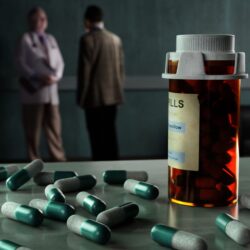Clinical Researcher—December 2023 (Volume 37, Issue 6)
SCIENCE & SOCIETY
Angela Terhune-Hargrove, MHA
Open a newspaper. Scroll through social media. Watch the news. It’s no secret that psychedelic therapy is on the verge of becoming the next big thing. In fact, this therapeutic area’s growth is perhaps the greatest advancement mental healthcare has seen in a long time. But I might be a bit biased.
Now I’m a Believer
I currently serve as Senior Director of Business Development and psychedelic subject matter expert at Elligo Health Research®. I’ve worked in addiction, clinical research, and in the mental health field for nearly three decades, but my deep commitment to advancing psychedelic therapy comes from a personal, harrowing ordeal.
My loving husband, a talented lawyer who runs a thriving business, grappled with profound mental health and addiction issues. Under immense professional pressure, a well-intentioned prescription for attention-deficit/hyperactivity disorder led my devoted husband down the treacherous path of Adderall addiction. This soon became the catalyst for his descent into abuse of alcohol and other substances. Our family was ensnared in a tornado of addiction and our household, once brimming with love and laughter, became a stage for traumatic events, hospitalizations, and a seemingly endless spiral of despair. With my mental health connections, I approached top-tier psychiatrists for help, but they inadvertently transformed my spirited husband into someone I no longer recognized: a zombie.
Amidst the chaos, he recalled his introduction to Dr. Deborah Mash’s groundbreaking work with ibogaine. Having grown up during the Reagan administration’s War on Drugs, we had our reservations about psychedelic drugs. But what other options did we have? We found our way to the Avante Ibogaine Institute in the Bahamas, where under the astute care of an experienced and dedicated team, my husband underwent ibogaine therapy.
The transformation was immediate and astounding. I knew it worked the moment we were reunited because that twinkle in his eye, the spark I love so much, was back. With a renewed vigor for physical and mental health, he’s now thriving as a loving husband, wonderful dad, and recovering addict who’s been substance-free for six years and counting. He was only treated with ibogaine once.
How Many Others Can We Save?
My personal experience with psychedelics aside, research has shown its incredible ability to relieve symptoms of anxiety, depression, post-traumatic stress disorder (PTSD), substance use disorder, and other mental health conditions.{1} In a survey of opioid-addicted patients who had undergone treatment with ibogaine, 80% reported that the psychedelic “eliminated or drastically reduced withdrawal symptoms,” and 30% described complete opioid abstinence following treatment.{2} The nonprofit Multidisciplinary Association for Psychedelic Studies (MAPS) has also produced impressive results from its two MDMA (3,4-Methylenedioxymethamphetamine, or “ecstasy”) therapy clinical trials for adults with PTSD, reporting that patients treated with MDMA treatment displayed “significant improvement over therapy with placebo when measured at two months after the last experimental session.”{3}
But psychedelic therapy is at a crossroads. It could be the transformative tool we need to help patients for whom existing treatments are not enough. However, if we take only a few steps down the wrong path, it could also become yet another almost-breakthrough. What can we do to ensure psychedelic therapy’s future?
3 Critical Actions to Secure the Future of Psychedelic Therapy
Based on my professional and personal experience, I suggest focusing on three key areas: education, safety, and specialty research sites.
Education and Training
Federal laws and policies, such as Nixon’s Controlled Substances Act and Nancy Reagan’s “Just Say No” anti-drug campaign, have negatively impacted the public perception of psychedelic therapy.{4,5} To negate negative perception and cultivate a more open-minded atmosphere in which these therapies can thrive, we must educate the public and the healthcare industry about the promising advantages and safety of psychedelic therapy. As history has demonstrated, we can rise above societal resistance. Medical innovations that were once met with apprehension and disbelief, such as organ transplantation, in vitro fertilization, and even vaccines, are now integral parts of our established standard of care.
Safety Standards
As with any other medical advancement, psychedelic therapy will only be fully accepted once it has rigorous safety and quality standards. The best place to start is by implementing such standards in psychedelic research. In June of 2023, the U.S. Food and Drug Administration released a draft guidance on psychedelic research, taking a big step in the right direction.{6} The guidance offers foundational recommendations to ensure subject safety and data quality, such as onsite psychotherapists to help patients make sense of their psychedelic experience and integrate what they learned into their lives. It also recommends a dual-monitor system to guarantee support and oversight throughout the treatment session, as well as more comprehensive disclosures to help patients understand that they might experience intense perception, cognition, and judgement changes during the treatment.
Specialty Research Sites
Many people who participate in a psychedelic clinical trial have never used psychedelic drugs or are suffering from intense symptoms that put them in a precarious state of mind. Therefore, given the novel and potentially overwhelming nature of psychedelics, it’s essential that research sites offer a calm, comforting environment in which the trial participants will feel safe and comfortable. Details such as covering mirrors, offering private restrooms during the treatment, and cultivating a serene and welcoming waiting room can be integral to the patient’s experience and the study’s success. Any sponsor or site undertaking psychedelic research must be prepared for and enthusiastic about the extra time, effort, and resources it will take to help the therapy reach its full potential, making specialty sites even more valuable to psychedelic advancement.
The Time is Now
The profound transformation in my husband’s life is a living testimony of the healing power of psychedelics at a time when so many Americans are desperate for answers to their suffering. If we promote education, ensure patient safety, and cultivate specialty sites, imagine how many more lives we can save.
As both a mental healthcare professional and the wife of a man who is alive and thriving because of these groundbreaking therapies, I am ready to put in the work to secure psychedelic therapy’s future. Are you?
References
- Correa, Bergman Re-Launch Bipartisan Caucus to Explore Psychedelic Research For Mental Health. 2023. Representative Lou Correa for California’s 46th District. https://correa.house.gov/news/press-releases/reps-correa-bergman-re-launch-bipartisan-caucus-to-explore-psychedelic-research-for-mental-health
- Davis A, Barsuglia JP, et al. 2017. Subjective effectiveness of ibogaine treatment for problematic opioid consumption: Short- and long-term outcomes and current psychological functioning. J Psychedelic Studies. https://www.ncbi.nlm.nih.gov/pmc/articles/PMC6157925/
- MAPS PBC Announces Positive Topline Results from Long-Term Observational Follow-Up Study on MDMA-Assisted Therapy for Treatment of PTSD. 2023. MAPS Public Benefit Corporation. https://mapsbcorp.com/press-releases/maps-pbc-announces-positive-topline-results-from-long-term-observational-follow-up-study-on-mdma-assisted-therapy-for-treatment-of-ptsd/
- War on Drugs. 2019. History.com. https://www.history.com/topics/crime/the-war-on-drugs
- Just Say No. 2018. History.com. https://www.history.com/topics/1980s/just-say-no
- Psychedelic Drugs: Considerations for Clinical Investigations Guidance for Industry. 2023. U.S. Department of Health and Human Services Food and Drug Administration Center for Drug Evaluation and Research. https://www.fda.gov/regulatory-information/search-fda-guidance-documents/psychedelic-drugs-considerations-clinical-investigations

Angela Terhune-Hargrove, MHA, (angela.hargrove@elligodirect.com) is an accomplished Senior Business Development and Clinical Research Professional within the pharmaceutical/contract research organization, psychedelic research, central nervous system, biotech, over-the-counter, cannabis, and dietary supplements industries who is known for fostering and leading teams that transform patient care and optimize operations.



